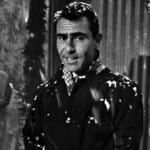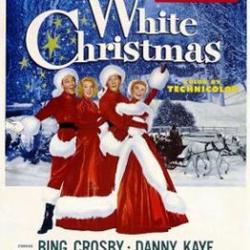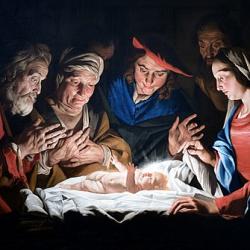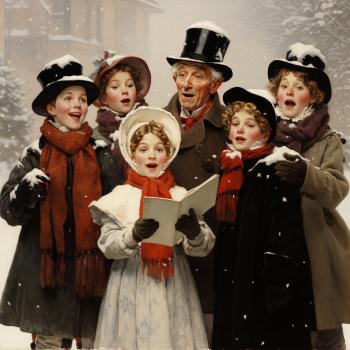There seems to be two things that you never want to talk about with others if you don’t want a fight to break out among family and friends, strangers and enemies.
Religion and Politics.
And that is true, if not more so, between those who profess to be of the same religion. So, you get individuals which turn into a collective like the Borg with a group hive mind on certain things such as how the mass should be celebrated, who you should vote for and support in the government and what aspects of culture you should or should not support. If anybody has spent any amount of time on social media, you may have witnessed more fights breaking out between fellow Catholics then hockey players during a hockey game. Some fellow Catholics verbally beat up on others worse then Star Wars fans dissatisfied with The Last Jedi.
But if you look and search like a observant detective, like Sherlock or Columbo, you can find things that any Catholic or like minded Christian with a sense of authentic spirituality would probably find spiritually uplifting. Even though disagreements tend to plague Catholic Twitter and FB like angry bees swarming over a bear that stole their honey, we all believe in and love Jesus and his church. So if we actually listen to our baptized brothers and sisters whom Christ died for we might find something worth thinking, wondering and pondering about.
It is with this spirit I present the following Christmas thoughts with this maximum in mind.
The diversity of thought within Catholic teaching, like variety within the strictures of sonnets, is one of its most beautiful features. It is nevertheless important to listen, as much as we can, to a broad chorus of Catholic thinkers. I have found great consolation in the fact that someone holier and smarter than myself has likely asked my questions already; my job is to find them and to listen, and then to make as many people as possible read block quotations about it.
Sharon Kabel , OSB vs. UFO: Stanley Jaki and the Theology of Aliens (June 16, 2021)- OnePeterFive
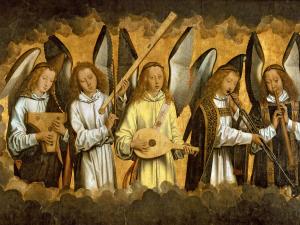
It can also be said like this…
I love when I find my thoughts are not original. It’s actually comforting to know that someone much more blessed with respect to intellect and spirituality has thought my thoughts.
Don’t just have a Good Christmas, have a Great Christmas. Here are some writings to help you with it.
Dear friends, Christmas is this, let us not let it be polluted by consumerism and indifference. Its symbols, especially the Nativity scene and the decorated tree, bring us back to the certainty that fills our hearts with peace, to the joy of the Incarnation, to God who becomes familiar: he lives with us, he gives a rhythm of hope to our days. The tree and the Nativity scene introduce us to the typical Christmas atmosphere that is part of the heritage of our communities: an atmosphere of tenderness, sharing and family intimacy. Let us not experience a fake Christmas, please, a commercial Christmas! Let us allow ourselves to be enveloped by the closeness of God, this closeness that is compassionate, that is tender; enveloped by the Christmas atmosphere that art, music, songs and traditions bring to our hearts.
-Pope Francis, To the delegations which donated the Christmas Tree and the Nativity Scene in St. Peter’s Square and in the Paul VI Hall (10 December 2021) | Francis (vatican.va)
Christmas carols abound at this time of year. This canon of carols and songs lives on because what they convey in words and music are true, deeply, resoundingly, wonderfully true. But truth does not exist in a finite time and space. It endures. After the Christmas songs end—and dead, undecorated trees appear at the end of driveways all on the 26th of December—where is the Christmas carol that asks us to act on the truth of what the Incarnation means after December 25?
It’s on page five of my falling-apart-at-the-seams book of simple piano Christmas carols: Good King Wenceslaus. The carol reminds us that that we must stand in the truth every day, not just the big and important days. Christmas’ infant lowly grows into an adult that washes the feet of women, eats with taxpayers, and speaks with lepers every and any day. This Gospel truth is “made flesh” in all of us, and so we must stand up every day for what that truth means.-Standing in the Truth of Christmas – Where Peter Is
We have a mission this Christmastime, as the revolution of the Incarnation continues. We bring our burdens to the manger and can refocus, by meditating on the baby Jesus, on what truly matters most. We can invite others to do the same, helping them to see Christmas with new eyes, to tell them what Jesus did for them, and why the nativity scene matters so much. There is no other time when Catholic images and themes feature so prominently in our culture. We gather with so many people at work and school, and in homes with family and friends. These gatherings give us natural opportunities to talk about what Christmas means for us and why the day still matters.
–Dr. R. Jared Staudt, How Christmas changed the world — and still can today – Catholic World Report
The Christmas Eve vigil – the wigilia (Vy-gyl-ia) to Poles and numerous Slavic cultures – has its origins in the deeply reverent observation of the conclusion of the Advent fast, and is thought by some scholars to emerge in part from earlier Jewish traditions. Aesthetically it is in many ways the evening twin of the Rorate Masses now being rediscovered throughout the Catholic world. Slavs around the globe often consider the wiligia to be the most beautiful evening of the year, and the tradition is one worth rediscovering in the west.
Wigilia, rather than New Years eve, was the passing of the year. Christmas Eve – not Christmas Day – was the deep celebration of the nativity. It was the spiritual heart of the year, and it would imbue me with a sense of reverence for this great night that I will surely keep until the day I die. For Poles today, the strength drawn from this candlelight-bathed formative tradition has doubtless served as a source of strength as the secular west assaults their religious sensibilities, while for others it has often served as a Catholic touch-point and profound memory through which to return to faith once again.
Awash in a sea of uncertainty and living in a new age of gathering darkness, we will nevertheless enthusiastically hold our wigilia meal this year. Joining in the motion of our ancestors and the joy of the Communion of Saints in celebrating the triumphant yet humble entrance of the Christ child, we will begin a purposeful Christmas season, enkindling candles of hope in the darkest nights of winter. In an age in which Catholics are rediscovering St. Nicholas’s feast day, the Rorate Mass, St. Lucy cakes and Epiphany blessings, the queen of these traditions warrants a rediscovery as well. This can be the year you re-institute or begin your own beautiful Christmas Eve tradition, for the spiritual edification of children “young and old alike,” for generations to come.Mark Nowakowski, PhD ,The Consummation of Advent: Rediscovering Christmas Eve – OnePeterFive
When you gaze at your Christmas tree and its many lights of red and blue and green, and its many branches holding many ornaments of every shape and texture, realize that the stable beneath it with the infant in his crib symbolizes the Incarnation — God become man so we may become like God — and that the many shepherds and wise men and sheep together with all those lights and ornaments remind us of our reality in the mystical body of Christ — many parts shining bright as one glorious tree of life.
And if you don’t have a tree, that’s all right, you get the idea.
Then, when you go to Mass on Christmas Day and get in your pew, be sure to look in front of you, to your left, then your right, then behind you, and you will see what you already are, an indispensable member of one great glowing family in Christ. What on earth could be more beautiful?
–Michael Leach, Christmas means we all belong, to Christ and to each other | National Catholic Reporter (ncronline.org)
The Victorians, at once devout and enterprising, invented the Christmas season as we know it. To this day, poems and stories like A Christmas Carol and The Little Match Girl color our picture of what the holiday is meant to be. But those stories bespeak an intense unease about how Christian disciples should navigate the blessing—or stumbling block—of unprecedented plenty. We are supposed to be generous with friends and family, to eat and drink and be full of cheer—without overlooking the yawning gulf between rich and poor, the plights of the lonely and dispossessed. It’s quite the slalom.
Our only foreign Christmas was in Montevideo, Uruguay. Mass was at the Cathedral in the central plaza of the city. It was a large church, but much in need of renovation and surprisingly lacking in attendance.
Regardless, Mass was Mass. In a different language, in an unusual setting, but at its core, the same. We saw the consecration, we received communion, we were able to pray before the tabernacle.
So as a Catholic, you are never alone. There is usually a church and fellow Catholics nearby. You fit right in because you are one of them. You feel comfortable because the liturgy is so familiar even if the building is not.
For Catholics, if you want a touch of home, all you have to do is go to Mass.-LOIS KERSCHEN, Catholics Are Always Home for Christmas | Musings From the Pew (patheos.com)
There is more to the canon of Christmas than the Gospels. There are symbols and sacramentals that proceed from this source, and Santa Claus is among them. Parents should not cut him out—especially not on the pretense of St. Nick being untrue. There are mysteries that subsist in the Mystery of the Word made Flesh. Keeping Christmas well, therefore, should include things wild and wonderful; things like elves, fairies, ghosts, and, yes, Bishop Staglianò, Santa Claus; things that reflect and recall that time when Heavenly nature took on earthly nature; and “doing” Santa Claus is preeminently one of those things.
So, let us by all means keep the worldly noise out of our children’s ears and let them enjoy the fancifulness of our Faith without burden. Telling kids that there is no Santa Claus, and that Christmas is just a tragedy of commercialism, is a kind of millstone that interrupts the innocence of children and puts up an obstacle to wonder. If children are deprived of wonder, their path to cynicism, virtual reality, pornography, and addiction is that much shorter. This Christmas, let us find the beauty in those invisible realities that include Santa Claus so that they can sustain us and our children through the fake world that lurks at our door.-SEAN FITZPATRICK,Yes, Bishop Staglianò, There Is a Santa Claus (crisismagazine.com)
This is a season to be shaken and disturbed, to wonder and to marvel. When the story of God-made-man is properly considered—the long-awaited arrival of the Messiah on earth who will teach us, redeem us, and usher in the New Jerusalem—it is inconceivable that it could ever be blandly domesticated. Truly considered, Christmas is shocking. Just try to wrap your mind around it: the omnipotent, omniscient, omnipresent Author of All deigned to assume flesh, enter history, and walk the earth with you and me for you and me. G.K. Chesterton marvels, “A mass of legend and literature, which increases and will never end, has repeated and rung the changes on that single paradox; that the hands that had made the sun and stars were too small to reach the huge heads of cattle.”- Dr. Tod Worner,Be Amazed and Afraid: Have Yourself a Jarring Little Christmas (wordonfire.org)
Christmas is therefore a radically subversive festival. Born into a realm of violence, the Christ child is uniquely vulnerable from the get-go. His parents were already turned away from an Inn, which, when you meditate upon that, means that the Inn keeper turned away a pregnant woman who was clearly near-ready to give birth. And perhaps that is precisely why he turned them away in the first place signaling just how indifferent and cold the ancient world could be to women, children, and even men of low estate. And immediately following the birth of Jesus, Joseph must take his family and flee to Egypt as the murderous political regime flexes its imperial muscles and begins the indiscriminate slaughter of children in order to calm the neurotic tremors of Herod who imagined that his precious power might be in jeopardy.
“Agony in the Garden.” It brings me back to my friend’s one word text: “agony”. When I look at the Christ child in the manger I do not imagine the little drummer boy and talking donkeys. I see instead a God who wishes to experience our agony from within. The silence of that manger in the cave takes my soul to the silence of that Garden and the silence of the tomb and the wordless pain of all who suffer alone. In the manger I see a God who is not play-acting at being a human being. I see a God who is about to experience a lifetime of vulnerability, pain and a horrific death. You might complain that I am not making enough proper theological distinctions between God “suffering in Jesus” and “God suffering in the Divine Nature as such”. Fine… your theological angina is duly noted. But those distinctions, though necessary, must never be allowed to mute, blunt, and render sterile, the very purpose behind the Incarnation in the first place. Theology is not Revelation. Christ is Revelation and theology is a second or third level meditation upon that primary fact – – the fact of the human Christ who suffers, dies, is buried, and rises again, and the God who is “implicated” in that same experience.-Dr. Larry Chapp- A Christmas Meditation: The Vulnerability of God | Gaudium et Spes 22
Christmas Movie Recommendations
Christmas movies for kids, like movies for kids generally, tend to fall into two categories: works of classic animation, usually older tales, that are calm, wholesome, and winsome, and works of digital animation, usually crazy, which have all the charm of a fever dream or a hallucinatory heave into the metaverse.
A welcome exception to the rule is found in two hidden gems on Netflix: Angela’s Christmas (2017) and Angela’s Christmas Wish (2020). These heartwarming short films from Damian O’Connor pair digital animation with classic storytelling—all wrapped in a beautiful Catholic bow.
These are children’s films in which deep themes of anxiety, suffering, and separation are handled with a deft touch and peppered with moments of smart laugh-out-loud (even giggle fit) comic relief. And all of it is finally a celebration of the great Christian love, hope, and faith of Angela and her family, gathered together in their humility around the baby Jesus—which, it bears repeating, is what Christmas is all about.Matthew Becklo – ‘Angela’s Christmas’: Two hidden gems for kids on Netflix (aleteia.org)
My father in-Law was born in Limerick and me wife will point out different landmarks as we were watching it. We could see King John’s Castle which we went to. She teared up as we was watching it, again. Check them out, their totally worth it.
I purposely got HBO MAX so I could watch this movie after watching the trailer to see if I would be interested. From the folks that brought you ELF, this film gets the holiday spirit off the ground with two big reindeer way up. It is in the style of A Christmas Story with the storytelling of A Princess Bride of a father telling his kid what it was like to desire a Nintendo for Christmas and the great lengths he and his friends had to do to get one. It had a set of wacky characters like The Sandlot. Like the Goldbergs it was 1980 something in a Wonder Years sort of way. There was even a nod to Stand By Me in one scene as part of one their schemes. It was a good nostalgia look back to when I was a Kid Type of Story. It was it’s own original story that stuck with the spirit of the other ones that I mentioned. A few missteps but none that derailed the film for me. Neal Patrick Harris has the knack for being a good narrator. The ending actually didn’t end the way I thought it would. It stirred emotion in me. A good and pleasant surprise that talks about having a Merry Christmas and shows a good relationship between father and son. Check it out for some laughs and heartfelt emotion.



